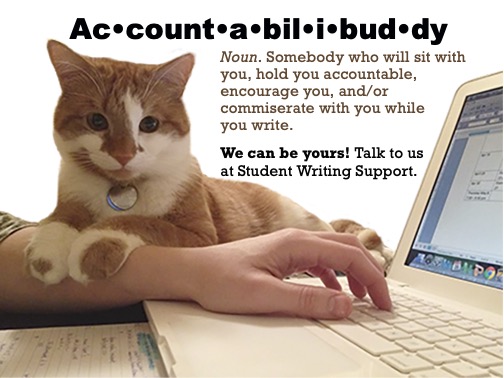- Campuses :
- Twin Cities
- Crookston
- Duluth
- Morris
- Rochester
- Other Locations

center for writing
writing.umn.edu
Accountabilibuddy consultations
What's an accountabilibuddy, and what's an accountabilibuddy consultation?
A combination of "accountability" and "buddy," an SWS accountabilibuddy is somebody who will sit with a writer and hold them accountable, encourage them, and/or commiserate with them as they write.
In Student Writing Support, an accountabilibuddy consultation is a writing consultation that involves the writer getting some writing done in the presence of the consultant. If you want to do some accountabilibuddying as all or part of your consultation, just ask! You can tell your writing consultant how you want the session to go, or you can ask for ideas about how to begin—consultants are here to support you!
Body doubling: a concept related to accountabilibuddying
Many people with ADHD describe the utility of "Body Doubling" for motivation to start, focus on, or complete tasks:
Not all people with ADHD find body doubling useful—in fact, it can be actively disruptive!—but many people, whether or not they identify as having an ADHD brain, benefit from having somebody else nearby when they need to complete a task (especially one they've been avoiding).
What an accountabilibuddy consultation can look like
Accountabilibuddy consultations can be any length within Student Writing Support's 40-minute visit times. Halfway through a consultation, you might realize that you could use some writing time; alternatively, you have might come in saying "I saw your accountabilibuddy ad, and I want that!"
For all versions of accountabilibuddy work, we recommend the following three-part structure:
- Beginning: Meet the consultant, talk about what would be supportive for you as a writer, and set a goal for the session.
- Middle: Depending on what you discussed during the Beginning part, you can proceed using one of the examples below, or by doing something else that you and the consultant determine together.
- End: Parking Downhill, or leaving the project in a place where it's easy to get it rolling again. On your own or supported by the consultant, jot down (a) what you got done today, (b) what's left to do in this project, and (c) what the first thing is that you're going to do when you next sit down to work on it. You can later use this "parking" material to get rolling again!
Example 1: Being there
“Being There” sessions are perhaps best captured by former client Zoe, who has actually asked of consultants the following things (shared with permission from Zoe):
"Can you just exist at me while I write this thing?"
"Please just listen to me word vomit on you as I brainstorm what to write."
"I don’t care if you scroll memes quietly for the next 40 minutes, I just need you to not let me stop writing."
With these requests, Zoe was asking for a consultant to just be present with her, and she also defined what “presence” meant for her at different times: sitting in shared silence, listening without interrupting, or just keeping her going. If this is something you're interested in, you can tell the consultant what kind of presence you want: do you want them to just stay at the table with you? Do you want them to watch you write? Do you want them NOT to watch you write? Basically, the consultant will just want to know from you what would be supportive for you in your time together.
Example 2: Active support
Consultants in these sessions are the equivalent of coaches for athletes. The consultant stays on the sidelines while the writer does the work, but they can also supply in-the-moment feedback, support, and direction based in their knowledge and experience as a writing consultant. You as a writer may want to do some writing during these sessions, but you may also want to describe your process or name where you are getting stuck. Once you feel unstuck again, you can keep going, knowing that the consultant will be an encouraging presence on the sidelines until it seems like it's time to check in again.
Example 3: The Pomodoro of Solidarity
The Pomodoro Technique is one way to make a task manageable and achievable by dedicating smallish chunks of time to focusing on one specific task. The typical Pomodoro length is 25 minutes, which can make it fit well in a 40-minute Student Writing Support visit (5 minutes of beginning, a 25-minute writing burst in the middle, and then 5 more minutes of wrapping up). We call this example "The Pomodoro of Solidarity" because it involves not merely the consultant's presence, but their actively working on their own writing in tandem with you as a writer. Both people are engaging in a task that they maybe haven't made time for or have been avoiding; the solidarity creates positive peer pressure.
Example 4: Sprints!
This version is grounded in the belief that we can do almost ANYTHING for just five minutes at a time. Here's one way to do it:
- With the consultant, figure out a task that you want to work on during your SWS visit. The more concrete, the better!
- The consultant will set a timer for 5 minutes. On "go!", you will work on that task until the alarm rings. The consultant can sprint along with you if they have your own writing project to get done, or they can just be present while you work—just tell the consultant what you'd like!
- At the end of the five-minute sprint, celebrate having worked on the thing! The consultant will check in with you to see if you want to make any changes to your goals or to the process you two are using. Then, when you're ready, the consultant will start another sprint.
You can do as many sprints as you like! The consultant will make sure to leave 5 minutes at the end to wrap up and talk with you about your next steps.



